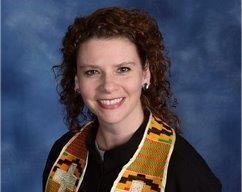A Community of Mentorship
Peace in Community
Rev. Dr. Annika Stroope
Leviticus 19:33-34; 24:22
“‘When the foreigner resides with you in your land, you shall not oppress them. The foreigner who resides with you shall be to you as the citizen among you; you shall love them as yourself, for you were foreigners in the land of Egypt: I am the Lord your God. …‘You are to have the same law for the foreigner and the native-born. I am the Lord your God.’” (NIV)
Reflection: Human beings have a natural instinct to identify ourselves not only by who we are, but also by who we are not. But although this instinct is natural, it is not always helpful in the context of making peace. A key spiritual discipline for people of faith is to see another person as a child of God, beloved by God, just as we are. This spiritual discipline disrupts the human instinct to identify ourselves by who we are not.
Scripture carries this tension. Portions of scripture witness to human beings engaged in war, genocide, prejudice and separation. Portions of scripture also witness to human beings crossing borders and boundaries, holding religious customs to the test of love, and Christ’s witness to see everyone as God sees God’s beloved creation.
Each week on Tuesday evenings at Central Presbyterian Church in Des Moines, Iowa, mentors who are members of the congregation, as well as medical students from Des Moines University, gather as mentors for a reading program. The mentees are children of families who came to Iowa as refugees from Sudan. Mentees speak Arabic at home with their families and worship in Arabic at First Arabic Presbyterian Church on Des Moines’ near west side.
Most of the mentors are from the “Baby Boom” generation and have roots in the Midwest. Pairs of mentors and mentees have been together for several years. They know one another’s family members and the names of pets. They have inside jokes from reading chapter after chapter of the youth novels whose main character is called “Captain Underpants.” Mentors and mentees eat supper together, prepared by volunteers from Central.
The Holy Spirit is present in the peacemaking that is the partnership between each mentor and mentee. The students’ young minds are molded by the acceptance and affirmation of the mentors. The mentors’ minds — no matter how many chronological years they have — are molded by the interaction and growth that they witness in their mentees. Without the intentional choice to create a space for these interactions, this growth could never take place.
Practice for Peacemakers: As we approach World Communion Sunday, ask yourself: Is there a neighbor with whom you have been reticent to connect? Allow the inspiration of World Communion Sunday’s bold and inclusive spirit to guide you to make a connection.
Prayer: Gracious God of our whole lives, we lift our praise and thanks to you. Guide our looking inward and our reaching out. May we be peacemakers within ourselves, that we may be peacemakers in your world. In Christ’s inclusive love, Amen.

The Rev. Dr. Annika Stroope is interim mission co-worker for Our Sister Parish, a partnership between a congregation in Iowa and the Pastoral House in Berlin, El Salvador. She also serves as parish associate for adult education and mission at Central Presbyterian Church in Des Moines, IA.
This year’s Season of Peace Resources are designed to help participants explore practices for building peace on every scale. From the personal level to global issues, these reflections and prayers will help grow the faith and witness of the whole church. Throughout the 29 days of the 2020 Season of Peace, we are invited to reflect upon:
Week 1 September 6–12: Peace Within
Week 2 September 13–19: Peace in Relationships
Week 3 September 20–26: Peace in Community
Week 4 September 27–October 3: Peace in the World
Final Day October 4: Holistic Peacemaking






No comments:
Post a Comment